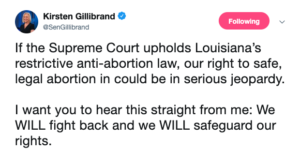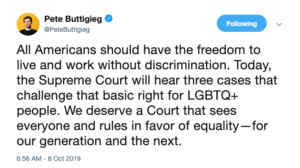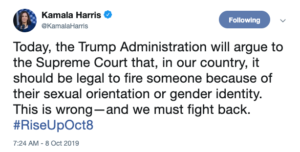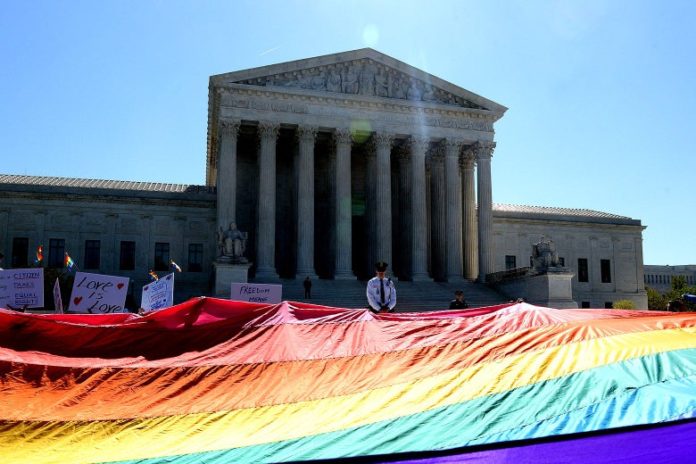Since the nomination of Neil Gorsuch and Brett Kavanaugh to the bench, both the Right and the Left have hypothesized the future of the Supreme Court. Will the conservative majority court strike down Roe v. Wade? Will the Affordable Care Act be declared unconstitutional?
The Supreme Court has made important decisions recently, such as the Court’s upholding of partisan gerrymandering in the cases of Rucho v. Common Cause and Lamone v. Benisek. However, high publicity issues have yet to take center stage. However, that is all about to change as the Court is currently considering and has approved to hear cases touching on both LGBT rights and abortion.
A Possible Challenge to Roe
Ever since confirmation last year, Brett Kavanaugh’s presence on the bench creates a 5-4 conservative majority on SCOTUS, worrying many groups. Notably, many on the Left fear encroachment on reproductive rights and a woman’s right to choose to have an abortion. With states like Alabama, Georgia, and Louisiana passing heartbeat bills placing extreme restrictions on abortion rights, it was only a matter of time before a suit arose which would make its way to the top.
Low and behold, a case has arisen. While not directly aimed at taking down Roe v. Wade, the Louisiana-based case, June Medical Services v. Gee, could potentially set a new precedent regarding access to abortion procedures in America. If affirmed by the Court, the decision could lead to states being allowed to shut down almost all abortion clinics, making access to abortion nearly impossible in certain areas. In Louisiana, the state would be able to close all but one abortion clinic.
The Court’s decision to take up the case has led to outrage by pro-choice advocates. Senator Kirsten Gillibrand (D-NY), known for her strong advocation for reproductive rights, tweeted following the Court’s action that “if the Supreme Court upholds Louisiana’s restrictive anti-abortion law, our right to safe, legal abortion in could be in serious jeopardy.” She also added that “We WILL fight back and we WILL safeguard our rights.” Many other congressmen and congresswomen on the Democratic side have also rallied against the possibility of the Court upholding Louisiana’s law.

The Future of LGBT Rights
Currently, the Court is debating and considering multiple cases dealing with whether or not businesses can discriminate based on sexual orientation. One of the more notable cases presently under debate is Bostock v. Clayton County. The case has the potential to block LGBT discrimination protections under the Civil Rights Act of 1964. The decision could change the lives of millions of LGBT people in what will likely be a landmark case.
The debate taking place has followed party lines so far, with the four liberal justices affirming the protection of gay and transgender people under the law. However, they require one of the five conservative justices to join them to prevent possible discrimination.
Known for his strict interpretation of laws, many have looked to Justice Neil Gorsuch as the possible flip in the case. In considering the repercussions of the decision, Gorsuch questioned if the issue was “more appropriate a legislative rather than a judicial function” due to its controversy. The case will likely test the Court’s dedication to judicial restraint or judicial activism, depending on the outcome.
Due to its timing, many government officials and presidential hopefuls have jumped in on the issue. Southbend, Indiana Mayor and presidential hopeful Pete Buttigieg, who also happens to be gay, stated, “all Americans should have the freedom to live and work without discrimination. Today, the Supreme Court will hear three cases that challenge that basic right for LGBTQ+ people. We deserve a Court that sees everyone and rules in favor of equality—for our generation and the next.”


Check back into The Roundup for more on US political news.






